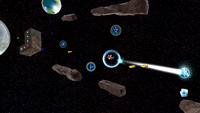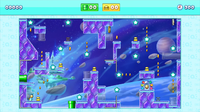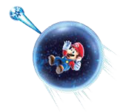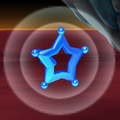Pull Star: Difference between revisions
Nintendo101 (talk | contribs) m (→Names in other languages: German) |
|||
| Line 90: | Line 90: | ||
|Ger=Greifstern | |Ger=Greifstern | ||
|GerM=Pull Star | |GerM=Pull Star | ||
|GerC=<ref>{{cite|author=[[Nintendo|Nintendo of Europe GmbH]]|date=2007|title=''Super Mario Galaxy Spielanleitung''|language=de|location=Frankfurt|publisher=Nintendo of Europe GmbH|page=20}}</ref> | |||
|Ita=Stella Manina | |Ita=Stella Manina | ||
|ItaM=Small Hand Star | |ItaM=Small Hand Star | ||
Revision as of 01:09, December 26, 2024
| Pull Star | |||
|---|---|---|---|
 Model from Super Mario Galaxy | |||
| First appearance | Super Mario Galaxy (2007) | ||
| Latest appearance | Super Mario 3D All-Stars (2020) | ||
| |||
- “Once this Luma transforms into a Pull Star, he will guide you to those faraway Template:Color-link.”
- —Polari, Super Mario Galaxy
A Pull Star is an object that appears in Super Mario Galaxy and Super Mario Galaxy 2. It resembles a small blue version of a Launch Star inside a blue bubble or orb. When activated, a Pull Star pulls Mario or Luigi towards it. Its name is a pun on "pulsar" or "pole star."
History
Super Mario series
Super Mario Galaxy

Pull Stars can be found in virtually every galaxy. When the player touches one with the Star Pointer, it uses a blue gravitational aura to lift Mario or Luigi off the ground, pulling him up toward it. Combining the power of these Pull Stars and using them in tandem can help either brother reach far heights or areas.
In some areas, Pull Stars are found orbiting other objects in the galaxy, such as Launch Stars or Power Stars. The player must use the right one at the right time to touch the object without accidentally "slingshooting" past it. In areas such as the Good Egg Galaxy and the Terrace, blue Lumas are shown to actually transform into Pull Stars, in much the same way as yellow Lumas mostly transform into Launch Stars or Sling Stars.
As with Launch Stars, Pull Stars occasionally need to be assembled by gathering Star Chips. Five blue Star Chips are needed to make a Pull Star or set of Pull Stars appear.
A single Pull Star appears in every dome onboard the Comet Observatory, where the Pull Stars allow the player to view the galaxies that are accessible from that particular dome. When they select a galaxy to fly to, the Pull Star transforms into a Launch Star, which then shoots Mario or Luigi to that galaxy.
Blue Star Capsule Planets are round glass planets that have a Pull Star in their center. There are three such planets in the Space Junk Galaxy and two in the Ghostly Galaxy. If Mario gets pulled and held by these planets, he cannot be stationary unlike normal Pull Stars due to the shape of the planet; instead, he continuously bounces on their surface as he is getting pulled.
Super Mario Galaxy 2
Pull Stars return as objects in Super Mario Galaxy 2, with the same role, although they appear much less frequently than in the previous game, appearing only in Bowser's Lava Lair, the Space Storm Galaxy, Melty Monster Galaxy, and the Grandmaster Galaxy. Pull Stars are also never formed from blue Lumas or Star Chips.
Mini Mario & Friends: amiibo Challenge
Pull Stars appear again in Mini Mario & Friends: amiibo Challenge, where they are referred to as Gravity Wells.[1][2] They are present in all levels of Gravity Galaxy and the fourth level of the Star World. When tapped on the GamePad, Gravity Wells release a gravitational field that can pull a Mini to their center. To remove the gravitational field, the player has to tap the Gravity Well again. Gravity Wells can be used to protect a Mini from a long fall or to pull it from behind a wall.
Profiles
Mini Mario & Friends: amiibo Challenge
- Play Nintendo: You can use the Gravity Well to guide your Mini through walls and floors. Tap on the blue star to put your Mini in bubble, then you can pull your Mini along. Tap the bubble to pop it and release your Mini.[1]
Gallery
Artwork of Mario using a Pull Star from Super Mario Galaxy
The Pull Star in the Terrace
Pull Stars in the Sling Pod Galaxy
Blue Star Capsule Planets in the Ghostly Galaxy
A Pull Star in Bowser's Lava Lair
Pull Stars in the Space Storm Galaxy
Artwork from Super Mario Galaxy 2
A Gravity Well pulling Mini Mario in Mini Mario & Friends: amiibo Challenge
Additional names
Internal names
| Game | File | Name | Meaning
|
|---|---|---|---|
| Super Mario Galaxy Super Mario Galaxy 2 |
ObjectData/GCaptureTarget.arc | GCaptureTarget | G-Capture Target |
| StageData/ObjNameTable.arc/ObjNameTable.tbl SystemData/ObjNameTable.arc/ObjNameTable.tbl |
Gキャプチャーターゲット (G Kyapuchā Tāgetto) |
Names in other languages
| Language | Name | Meaning | Notes |
|---|---|---|---|
| Chinese (simplified) | 牵引星[?] Qiānyǐn Xīng |
Traction Star | |
| Chinese (traditional) | 牽引星[3] Qiānyǐn Xīng |
Traction Star | |
| French | Étoile crampon[4][5] | Cling star | |
| German | Greifstern[6] | Pull Star | |
| Italian | Stella Manina[?] | Small Hand Star | |
| Korean | 스타중계소[7] Seuta Junggyeso |
Star Relay Center | |
| Spanish | Estrella imán[?] | Magnet star |
References
- ^ a b Mini Mario & Friends: amiibo Challenge Items. Play Nintendo (American English). Retrieved April 6, 2020. (Archived August 16, 2020, 21:52:14 UTC via Wayback Machine.)
- ^ Nintendo of America (April 28, 2016). Mini Mario & Friends: amiibo Challenge – Objects Introduction (01:17). YouTube (American English). Retrieved April 6, 2020.
- ^ 2010. 超級瑪利歐銀河2 (Chāojí Mǎlìōu Yínhé Èr) manual. Nintendo (Traditional Chinese). Page 27.
- ^ Super Mario Galaxy, Le Guide Officiel. Prima Games. Page 126.
- ^ Super Mario Galaxy 2, Le Guide Officiel. Prima Games. Page 11.
- ^ Nintendo of Europe GmbH (2007). Super Mario Galaxy Spielanleitung. Frankfurt: Nintendo of Europe GmbH (German). Page 20.
- ^ "이 아이가 변신하면 로 스타중계소를 조준하고 를 눌러 주세요" – Polari (2008). Super Mario Wii: Galaxy Adventure. Nintendo (Korean).












